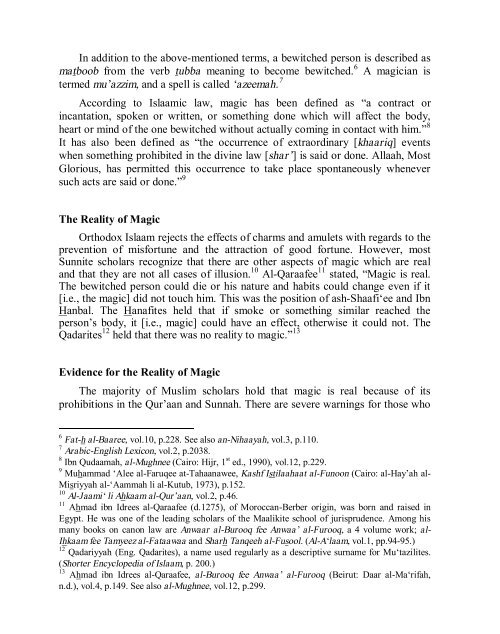You also want an ePaper? Increase the reach of your titles
YUMPU automatically turns print PDFs into web optimized ePapers that Google loves.
In addition to the above-mentioned terms, a bewitched person is described as<br />
matboob from the verb tubba meaning to become bewitched. 6 A magician is<br />
termed mu’azzim, and a spell is called ‘azeemah. 7<br />
According to Islaamic law, magic has been defined as “a contract or<br />
incantation, spoken or written, or something done which will affect the body,<br />
heart or mind of the one bewitched without actually coming in contact with him.” 8<br />
It has also been defined as “the occurrence of extraordinary [khaariq] events<br />
when something prohibited in the divine law [shar’] is said or done. Allaah, Most<br />
Glorious, has permitted this occurrence to take place spontaneously whenever<br />
such acts are said or done.” 9<br />
The Reality of Magic<br />
Orthodox Islaam rejects the effects of charms and amulets with regards to the<br />
prevention of misfortune and the attraction of good fortune. However, most<br />
Sunnite scholars recognize that there are other aspects of magic which are real<br />
and that they are not all cases of illusion. 10 Al-Qaraafee 11 stated, “Magic is real.<br />
The bewitched person could die or his nature and habits could change even if it<br />
[i.e., the magic] did not touch him. This was the position of ash-Shaafi‘ee and Ibn<br />
Hanbal. The Hanafites held that if smoke or something similar reached the<br />
person’s body, it [i.e., magic] could have an effect, otherwise it could not. The<br />
Qadarites 12 held that there was no reality to magic.” 13<br />
Evidence for the Reality of Magic<br />
The majority of Muslim scholars hold that magic is real because of its<br />
prohibitions in the Qur’aan and Sunnah. There are severe warnings for those who<br />
6 Fat-h al-Baaree, vol.10, p.228. See also an-Nihaayah, vol.3, p.110.<br />
7 Arabic-English Lexicon, vol.2, p.2038.<br />
8 Ibn Qudaamah, al-Mughnee (Cairo: Hijr, 1 st ed., 1990), vol.12, p.229.<br />
9 Muhammad ‘Alee al-Faruqee at-Tahaanawee, Kashf Istilaahaat al-Funoon (Cairo: al-Hay’ah al-<br />
Misriyyah al-‘Aammah li al-Kutub, 1973), p.152.<br />
10 Al-Jaami‘ li Ahkaam al-Qur’aan, vol.2, p.46.<br />
11 Ahmad ibn Idrees al-Qaraafee (d.1275), of Moroccan-Berber origin, was born and raised in<br />
Egypt. He was one of the leading scholars of the Maalikite school of jurisprudence. Among his<br />
many books on canon law are Anwaar al-Burooq fee Anwaa’ al-Furooq, a 4 volume work; al-<br />
Ihkaam fee Tamyeez al-Fataawaa and Sharh Tanqeeh al-Fusool. (Al-A‘laam, vol.1, pp.94-95.)<br />
12 Qadariyyah (Eng. Qadarites), a name used regularly as a descriptive surname for Mu‘tazilites.<br />
(Shorter Encyclopedia of Islaam, p. 200.)<br />
13 Ahmad ibn Idrees al-Qaraafee, al-Burooq fee Anwaa’ al-Furooq (Beirut: Daar al-Ma‘rifah,<br />
n.d.), vol.4, p.149. See also al-Mughnee, vol.12, p.299.














